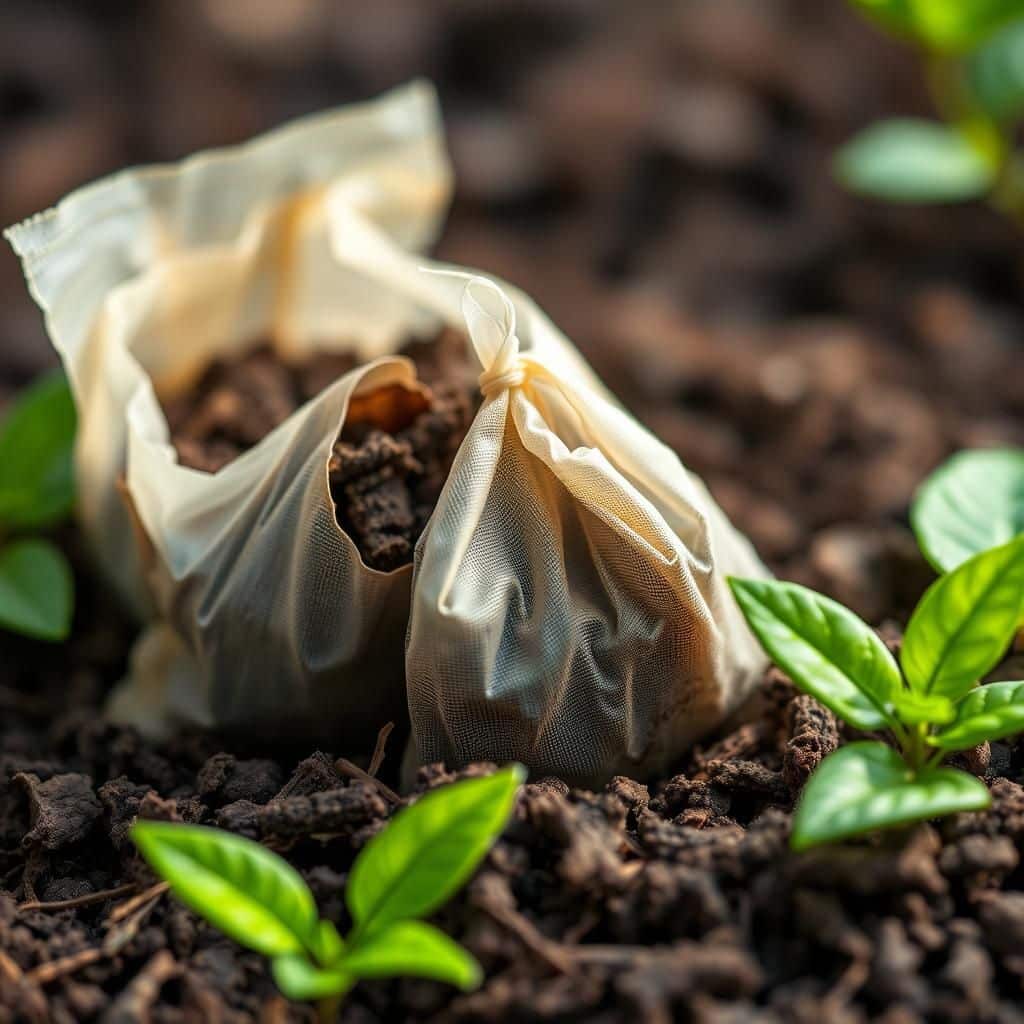Can You Compost Tea Bags? Everything You Need to Know for Eco-Friendly Gardening

As more people embrace eco-friendly gardening practices, the question arises: can you compost tea bags? This seemingly simple query holds significant implications for sustainability and waste reduction. While tea bags can provide valuable nutrients to garden soil, not all tea bags are created equal. Some contain materials that may not break down in a compost pile, potentially harming your composting efforts. In this article, we will explore the ins and outs of composting tea bags, the various types available, and tips for ensuring your gardening practices remain environmentally friendly. Discover how you can transform tea waste into a green resource for your garden.
Can You Compost Tea Bags?
Yes, you can compost tea bags, but it is important to check the materials used in the bag itself. Many tea bags are made from natural fibers like paper, which are compostable, while others may contain synthetic materials that are not suitable for composting. Moreover, the tea inside the bags is generally biodegradable, making it a beneficial addition to your compost pile. To ensure you're composting effectively, always remove any staples or plastic components from the tea bags before adding them to your compost, and consider using bags made from organic materials.
What Ingredients Are in Tea Bags?
Tea bags can be made from various materials, including paper, silk, and nylon. Most conventional tea bags are composed of bleached paper that is safe to compost. However, some brands use nylon or polyproplyene, which are plastics, and these should be avoided in compost. Additionally, the contents of the tea, such as dried herbs, leaves, and spices, are generally organic and will decompose effectively in the compost heap.
How to Identify Compostable Tea Bags?
To determine whether a tea bag is compostable, look for labels that specify it is made from 100% biodegradable or natural fibers. Brands that use biodegradable materials will often state this on their packaging. If the bag feels silky or you notice any shiny components, it could contain synthetic fibers that are not suitable for composting. A simple test involves tearing the bag; if it breaks apart easily into fibers, it is usually compostable.
Benefits of Composting Tea Bags
Composting tea bags offers several benefits to your garden. The decomposed tea can enrich your soil by adding essential nutrients and improving moisture retention. Moreover, tea leaves can introduce microorganisms that help break down organic matter, which creates a healthier compost mix. When added to the compost, tea bags can also help balance the carbon-to-nitrogen ratio, making the composting process more efficient.
See also:
What Not to Compost with Tea Bags?
While tea bags can be composted, there are specific items you should avoid adding. Do not compost tea bags that contain any plastic materials, as they will not break down. Additionally, avoid composting tea bags with additives such as sugar, flavors, or preservatives, as these can attract pests and negatively affect the compost quality. It's also best to exclude any bags that are heavily bleached or contain non-organic ingredients.
Best Practices for Composting Tea Bags
For optimal results when composting tea bags, always remove any staples or synthetic parts before placing them in the compost bin. Shredding or cutting open the bags can also expedite the decomposition process. It's useful to mix the tea bags with green materials like vegetable scraps to maintain a proper balance of nitrogen and carbon in your compost pile. Ensure that your compost remains aerated and damp to assist in breaking down the organic material effectively.
| Material | Compostable? |
|---|---|
| Paper | Yes |
| Nylon | No |
| Silk | Yes |
| Plastic | No |
| Natural Fibers | Yes |
Understanding the Components of Tea Bags and Their Compostability
Many tea bags are made from a variety of materials, including paper, plastic, and sometimes even silk. This composition plays a critical role in determining whether they can be successfully composted. While many people assume that all tea bags are compostable, it is essential to check the packaging or manufacturer's information first. Natural fiber tea bags such as those made from pure paper are generally safe for composting, as they break down efficiently. However, tea bags with synthetic components can introduce microplastics into the soil, negatively impacting the composting process and the environment.
The Benefits of Composting Tea Bags
Composting tea bags can provide numerous benefits to your garden, as they add valuable nutrients to the soil. When tea bags decompose, they release nitrogen, which is a crucial element for healthy plant growth. Additionally, tea leaves contain antioxidants and other compost-friendly compounds that can enhance microbial activity in your compost pile. This can lead to richer, more fertile compost that supports healthier plants and contributes to a sustainable gardening practice.
How to Identify Compostable Tea Bags
To determine whether a tea bag is compostable, check the label for information regarding its materials. Look for bags made from natural fibers like paper or cotton, which are typically compost-friendly. Avoid tea bags that have plastic lining or are made from synthetic fibers, as these will not break down naturally and could harm the environment. If in doubt, consider using loose leaf tea as a more reliable alternative for eco-friendly gardening.
See also:
Potential Issues with Composting Tea Bags
One of the main issues with composting tea bags relates to the presence of non-biodegradable materials. For tea bags that contain plastic components, they can lead to the accumulation of microplastics in your compost, which eventually ends up in your soil and plants. Furthermore, if tea bags contain additives like flavorings or preservatives, these chemicals might hinder the composting process and negatively affect soil quality. To avoid these issues, it's crucial to pay attention to the ingredients of the tea and compost only those bags that are purely natural.
Tips for Effective Composting of Tea Bags
To effectively compost tea bags, it's advised to remove the staples and any non-biodegradable components before adding them to your compost pile. This will help ensure that only organic materials will break down. Additionally, tear open the tea bags to disperse the leaves more evenly and accelerate the decomposition process. Mixing the tea bags with other green and brown materials in your compost can also improve air circulation and aid in the breakdown of organic matter, resulting in nutrient-rich compost for your garden.
Other Compostable Items to Consider for Eco-Friendly Gardening
In addition to tea bags, there are several other kitchen scraps that can be composted to benefit your garden. Fruit and vegetable peels, coffee grounds, and eggshells are excellent sources of nutrients. These items contribute important minerals, enrich the compost, and enhance its overall quality. By diversifying the compost ingredients, gardeners can create a balanced compost mix that supports robust plant growth while minimizing waste and promoting a more sustainable lifestyle.
Questions from Our Readers
Can you compost tea bags?
Yes, you can compost tea bags, but it's important to check the material of the bag first. Many tea bags are made from paper, which is compostable, while others may contain plastic materials that do not break down in compost. Always remove any staples or plastic components before composting.
What types of tea bags should I avoid composting?
You should avoid composting tea bags made from synthetic materials, such as polypropylene, which is often used to seal bags. These types of bags can take a long time to decompose, making them unsuitable for home composting. Additionally, always check for any coating or non-biodegradable substances.
See also:
What are the benefits of composting tea bags?
Composting tea bags can provide several benefits for your garden. They can introduce nutrients into your compost pile or garden soil, as tea leaves are rich in nitrogen and other beneficial elements. This can help improve soil structure and promote healthy plant growth.
Can I compost herbal tea bags the same way?
Yes, you can compost herbal tea bags in the same way as traditional tea bags. Just ensure that the bag is made from compostable materials and contains no synthetic parts. Additionally, herbal teas often come with their own unique nutrients, adding diversity to your compost and enriching your garden.

If you want to read more articles like Can You Compost Tea Bags? Everything You Need to Know for Eco-Friendly Gardening, we recommend you check out our Compost category.
Leave a Reply
Related Articles